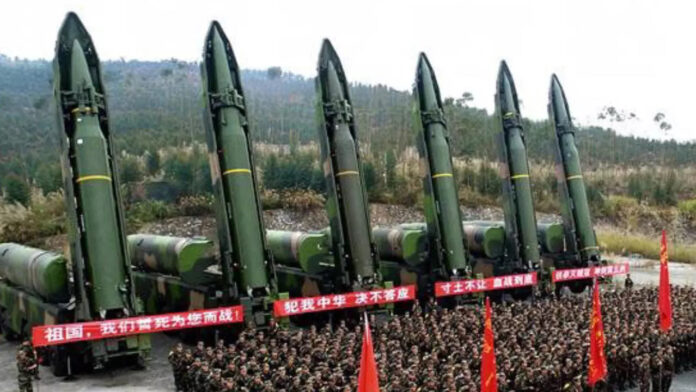Taiwan finds itself at the center of escalation in the US-China Cold War. The new Cold War is not a temporary phase in global relations – Biden’s anti-China policies aim to “win the 21st Century”.
Vincent Kolo
In April, The Economist magazine featured Taiwan on its cover as “the most dangerous place on earth”. The headline provoked heated discussion. How could Taiwan be bracketed together with North Korea, Afghanistan or Gaza? But in recent years, and especially in the months since Joe Biden’s administration took office, pushing the Indo-Pacific and the strategic struggle with China to the top of its priorities, tensions across the Taiwan Strait have risen to an unprecedented level.
In the epoch-making 21st Century conflict between US and Chinese imperialism, Taiwan is pivotal for economic, political and geostrategic reasons. For the CCP-state (China’s misnamed and thoroughly non-communist dictatorship), Taiwan is a potent nationalist symbol, without the acquisition of which China’s “great national rejuvenation” will remain unfulfilled. But this symbolic importance alone does not explain the CCP’s Taiwan policy.
China’s red lines
The CCP regime cannot allow Taiwan to be formally “separated” and annexed to the Western US-led camp in the developing Cold War conflict. Therefore, a formal Taiwanese declaration of independence, a push for this by the US and other major powers, or the stationing of US military forces on the island, are all ‘red lines’ that if breached would represent a historic defeat for the Chinese regime and threaten to end its rule. This is why Beijing is not just turning up the wolf warrior rhetoric, but also increasing its air and naval activity around Taiwan (a record 380 PLA Air Force incursions into Taiwan’s airspace in 2020, and a further increase this year). A parallel escalation is taking place by both sides in the disputed waters of the South China Sea, which is closely related to the Taiwan conflict. Beijing’s actions are to warn Taipei and Washington not to challenge its ‘red lines’, as well as providing nationalistic background music for Xi Jinping’s internal power struggles, to cement his lifetime rule over the CCP-state.
For the US side, the reverse applies: If China was to “reunify” with Taiwan, bringing it firmly into its camp under PLA control, this would be a historic defeat for US imperialism. Militarily, control of Taiwan would allow China to dominate East Asia and the Western Pacific. The US would be decisively weakened, its strategic alliances with regional powers such as Japan, South Korea, India and Australia would begin to unravel. American credibility as the main superpower in Asia (since 1945) would be dealt an irreversible blow.
Parallels with Suez
Commentators have drawn parallels with the 1956 Suez Crisis, when Egypt defeated the attempt of Britain, France and Israel to seize control of the Suez Canal after it was nationalised by radical Pan-Arabist president Gamal Abdel Nasser. Suez marked the end of British and European imperialism as global powers. The US stayed out of the Suez fiasco, allowing its allies to be humiliated. If the US failed, or refused, to prevent a PLA takeover of Taiwan, this would mark a historic turning point: America’s ‘Suez moment’. But such an outcome in today’s conditions would be worse for Western capitalism. As The Economist explained quoting Matt Pottinger, Trump’s head of Asia policy, when Britain stumbled at Suez the US had already taken its place as the leader of the Western world. Today, “There’s not another United States waiting in the wings.”
Clearly, none of the major powers involved in today’s Cold War view the ‘Taiwan question’ from the standpoint of the wellbeing, security, or democratic rights of its people. The 23m Taiwanese have the misfortune to have become a vital chess piece in the contest over who will wield ultimate power and control in the Indo-Pacific region. In Taiwan, the full significance of this geopolitical alignment of forces is only gradually being understood. Mass consciousness is complicated by the role of the bourgeois leaders of Taiwan nationalism (the governing pan-greens) who exploit the deep seated hostility towards the CCP dictatorship to promote a pro-US agenda and to win votes.
Among the grassroots base of Taiwan nationalism, especially the younger generation who overwhelmingly back independence and see it as a guarantee of democratic rights, there is a feeling the question can be decided within Taiwan itself, or through diplomacy and allying with the US. This despite the US track record of backing 75 percent of the world’s dictatorships and betraying countless promises of support (to the Kurds, women in Afghanistan, the Tibetan Khampa guerillas) when Washington’s geopolitical interests changed. For US imperialism, as its support for Chiang Kai-shek’s regime showed, there would be no moral qualms about supporting a dictatorship to rule Taiwan in future providing it was “one of ours”.
As a general principle the idea that Taiwan – its people – should decide the island’s future is of course very reasonable. But this will not happen on the basis of capitalism and imperialism. Taiwan’s fate, unfortunately, will be decided by Beijing and Washington, by their struggle to “win the 21st Century”, which is being waged over the heads of the Taiwanese people. Only the success of the international socialist revolution to end capitalism and imperialism can give the masses of Taiwan and other countries control over their own futures.
“Strategic ambiguity”
Both American and Chinese capitalism want to control the Taiwan chess piece. More correctly, they must at all costs prevent the other side capturing control. For this reason, a geostrategic stalemate has been acceptable to both sides up until now. This is the origin of the ‘One-China policy’, which the US still formally upholds, under which Taiwan is not recognised as an independent state. Adhering to ‘One-China’, in accordance with diplomatic protocols agreed 50 years ago by US president Richard Nixon and China’s leader Mao Zedong, was the price US imperialism was prepared to pay to recruit China to its side in the original Cold War against the USSR. As part of that shift in world relations, Taiwan was unceremoniously booted out of the United Nations in 1971.
The US policy of ‘strategic ambiguity’ towards Taiwan originated at the same time. The US undertakes to ‘protect’ (sell arms to) Taiwan, but does not explicitly say it will come to the island’s defence in the event of a Chinese attack. Today the situation is very different. Both sides have massively raised tensions over Taiwan especially since Biden came to power. Compared to Trump’s erratic policies, Biden is pursuing a more coordinated, planned and – so far at least – diplomatically sophisticated strategy to squeeze China (international alliances and “America is back at the table”). Xi’s regime has cranked up its nationalistic wolf warrior foreign policy and domestic repression in response.
The US fears that China’s growing military capacity will eventually allow it to forcibly seize Taiwan. China’s navy is now bigger than America’s (360 vessels versus 297). China would have the advantage of fighting much closer to home. An intense debate is taking place in US military and foreign policy circles over whether ‘strategic ambiguity’ should now be abandoned in favour of an explicit US guarantee to intervene militarily on Taiwan’s side. Contrary voices warn this could itself be the spark that prompts Xi’s regime to launch an invasion.
Instead of jettisoning ‘strategic ambiguity’ outright, Biden and his collection of born-again US allies have changed the messaging, to suggest an ever-so-slight change of posture as a warning to Xi. At the June G7 summit in England, and when Japanese PM Yoshihide Suga met Biden two months earlier, the official communiqués mentioned the “importance of peace and stability across the Taiwan Strait”. Never before has Taiwan been mentioned at the forums of Western leaders. This was seen as a provocation by Beijing, which was the intention. More recently, Japan’s deputy PM warned that a Chinese attack on Taiwan would pose an “existential threat” to Japan, clearly implying the country would go to war to defend Taiwan. Australian politicians including defence minister Peter Dutton have made similar warnings in recent months.
In July, Biden’s Coordinator for the Indo-Pacific Kurt Campbell delivered a widely reported speech reiterating the US line, “we do not support Taiwan independence”. This of course is nothing new, it has been US policy since Nixon-Mao. But the most important part of Campbell’s speech was a warning to the Chinese regime that an attack on Taiwan would be “catastrophic”. Campbell said there was “a clear sense” the CCP is quietly assessing the global response to the crackdown in Hong Kong to gauge how the world might react if it should attempt a similar move against Taiwan.
Campbell’s speech implicitly acknowledged the US is powerless to stop the political strangulation of Hong Kong, but warned the CCP not to expect similar latitude in the case of Taiwan. A chicken race dynamic is unfolding with both sides resorting to more extreme behaviour in order to deter the other. But as neither can afford to lose face this simply fuels further escalation.
Will Xi Jinping attack?
So how great is the danger of a CCP attack on Taiwan? While the rhetoric has hardened significantly (the word “peaceful” has now been officially deleted from the CCP’s “reunification” mantra), Xi Jinping would not risk a war unless he is completely confident he would win. Militarily and geographically a massive force would be needed to invade Taiwan due to its rocky coastline and unpredictable weather patterns. For a dictatorial regime especially, there is no bigger moment of danger than war (other than revolution), and the repercussions of defeat as the examples of Russia 1904-5, Argentina 1982, and many others show. A military debacle, being forced to abort an invasion, suffering heavy losses – these things could trigger a governmental crisis, probably the fall of Xi Jinping, and possibly the collapse of the CCP regime.
The other crucial question is how would the CCP rule Taiwan? Given the overwhelming opposition of the masses in Taiwan to unification and to the CCP, this would require an enormous military occupation and police state. Even if this succeeded it would pose the danger of imperial overreach for Beijing, with failures and mass resistance in Taiwan creating a feedback loop spreading instability and unrest back into China. There was a certain logic to the “one country, two systems” arrangement offered to Taiwan for many years, with Hong Kong held up as a possible model. This envisaged Beijing ruling Taiwan through a pro-CCP Kuomintang or similar ‘comprador’ administration, not unlike the early years of Hong Kong’s post-97 handover. But this option, never very likely, has been destroyed by Xi Jinping’s bloody-minded subjugation of Hong Kong. “One country, two systems,” arouses mass revulsion in Taiwan. Even the Kuomintang has come out against it.
Revolutionary crisis
In this way, Xi Jinping’s hardline strategy towards Hong Kong has painted his regime into a corner over Taiwan. The CCP cannot of course let go of the goal of “reunification” but now this can only realistically be achieved by war. As part of its Cold War mobilisation, the US military has issued numerous warnings that Beijing could launch a Taiwan invasion in six years, “or closer than most people think”, as Admiral John Aquilino, commander of the US Indo-Pacific Command, stated earlier this year.
At this stage, these predictions seem exaggerated. But other scenarios could arise if the current balance of power shifts decisively in one direction or the other. For example, in the event of an acute crisis in China, a revolutionary crisis, Xi Jinping or his successor could be panicked into launching a military attack as a political diversion – a case of “Wag the Dog” with Chinese characteristics. On the other hand, a future deep political crisis or economic collapse in the United States could force a withdrawal of US military power from the Indo-Pacific, creating a power vacuum that, based on today’s constellation of forces, only China would be poised to fill. Under this scenario, Taiwan and its weak and unstable bourgeois democracy could face a Czechoslovak outcome – to be ‘traded’ as part of a wider imperialist accord.
Again, these variants of perspectives show that Taiwan’s fate will not be decided primarily by its own internal dynamics. The workers’ movement and the youth who increasingly want independence need to understand that their struggles must as a matter of urgency link up with workers and youth in China, the US, and globally. Some on the left and a great many in the radical nationalist milieu fail to make this connection and tend to view world relations, China, the US-China Cold War, as interesting external developments without great relevance to Taiwanese politics. But on a capitalist basis Taiwan is unlikely to ever achieve independence notwithstanding the clear wishes of a majority of its people.
Kurt Campbell has just reminded everyone that Taiwan independence is opposed not by one, but both imperialist superpowers. Taiwan’s destiny under capitalism is to be a prisoner of the imperialist Cold War: stateless, highly militarized and under the shadow of a possible ‘hot’ war. Socialists fight to win the workers’ movement to a socialist program to take power and abolish Taiwan capitalism, fully upholding the right to self-determination of Taiwan’s people, as part of a wider struggle against capitalism and imperialism throughout Asia and globally.




